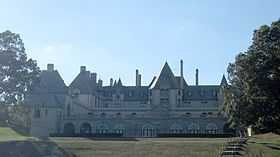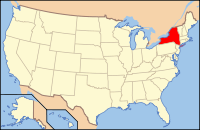Oheka Castle
|
Oheka | |
 | |
|
Oheka Castle seen from the east | |
 | |
| Location | 135 W. Gate Dr., Huntington, New York |
|---|---|
| Coordinates | 40°49′40″N 73°26′55″W / 40.82778°N 73.44861°WCoordinates: 40°49′40″N 73°26′55″W / 40.82778°N 73.44861°W |
| Area | 23.2 acres (9.4 ha) |
| Built | 1915 |
| Architect | Delano & Aldrich; Olmsted Brother, et al. |
| Architectural style | Late 19th And Early 20th Century American Movements, Chateauesque |
| Governing body | Private |
| NRHP Reference # | 04000996[1] |
| Added to NRHP | September 15, 2004 |
Oheka Castle, also known as the Otto Kahn Estate, is located on the Gold Coast of Long Island, in Huntington, New York. It was the country home of financier and philanthropist Otto Kahn. Built by Kahn between 1914 and 1919, it was and remains the second largest private home in the United States, comprising 127 rooms and over 109,000 square feet (10,100 m2), as originally configured. It is currently a historic hotel with 32 guestrooms and suites on the upper floors of the mansion, a popular wedding venue for socialites, celebrities, and dignitaries, and the backdrop to many photoshoots and Hollywood productions. The estate also offers historic mansion tours of the estate and gardens. In 2004, Oheka was listed on the National Register of Historic Places. [1] Oheka Castle is a member of Historic Hotels of America, the official program of the National Trust for Historic Preservation.[2]
Name
The name Oheka is an acronym of its original owner's name, Otto Hermann Kahn, also used for his yacht Oheka II.
History

In 1905, a previous country home of Kahn's, Cedar Court in Morristown, New Jersey, was virtually destroyed by fire. In constructing Oheka, Kahn determined to build a fireproof building, so he had his architects, Delano and Aldrich, design the building out of steel and concrete, making it one of the first totally fireproof residential buildings. In constructing the home, two entire years were spent building an artificial hill on which to place it, giving it views of Cold Spring Hills and Cold Spring Harbor.[3]
Kahn commissioned the Olmsted Brothers to design the estate's grounds, centered on a formal axial sunken garden in the French manner, of clipped greens and gravel in parterres and water terraces, screened by high clipped hedging from the entrance drive that ran parallel to the main axis (illustration, left). Other features of the 443-acre (1.79 km2) complex included an 18-hole golf course designed by golf architect Seth Raynor, one of the largest private greenhouse complexes in America, tennis courts, an indoor swimming pool, a landing strip, orchards, and stables.
Several years after Kahn's death in 1934, the estate was sold. After the sale, it was used for several purposes, including as a retreat for New York City sanitation workers. In 1948, Eastern Military Academy purchased the castle and 23 acres (93,000 m2) of its property, bulldozed the gardens, subdivided the rooms and remained until the school closed in 1979. For the next four years, the building remained empty, during which time over 100 documented arson attempts occurred, all of which the building survived, demonstrating Kahn's success in building a fireproof building. As of 1946, the golf course and stables are a part of the Cold Spring Country Club and the greenhouse complex operates as Otto Keil Florist. Much of the remainder of the property was developed into single-family homes.
Restoration

In 1984, Oheka was purchased by Gary Melius, a Long Island developer. Melius undertook the largest private residential renovation project in the United States to restore the house, which was in a state of almost total disrepair, and recreate the gardens from the original Olmsted plans. In 1988, unable to continue financing the massive project, Melius sold the property to Hideki Yokoi for $22.5 million.[4] Ten years later, following a lawsuit, the building passed to one of Yokoi's daughters and her husband.[5] They were unable to sustain the property themselves, so Melius reacquired it under a long-term lease and later re-purchased the estate, operating it as a weddings and events venue, luxury hotel, and conference center.[6] The estate also offers mansion tours.
Celebrities who have been married there include Kevin Jonas, Megyn Kelly, Joey Fatone and former U.S. Congressman Anthony Weiner.
Popular culture
- Oheka served as partial inspiration for Gatsby's estate in F. Scott Fitzgerald's The Great Gatsby.[7]
- In the 1941 film Citizen Kane, photographs of Oheka were used to portray the fictional Xanadu.[8] [9]
- In 2004, Joey Fatone from the group 'N Sync married his fiancé at Oheka.
- In 2008, the castle could be seen in the movie What Happens in Vegas, with stars Cameron Diaz and Ashton Kutcher
- In 2009, Kevin Jonas from the band Jonas Brothers married his fiancé Danielle Deleasa at Oheka.
- In 2009-Present, the castle is Boris's mansion "Shadow Pond" on the television show Royal Pains.
- In 2010, Oheka was the set of the fictional Avalon Castle on the soap opera, As The World Turns.
- In 2010, it was used to film a scene in It's Kind of a Funny Story.
References
- ↑ 1.0 1.1 "National Register Information System". National Register of Historic Places. National Park Service. 2010-07-09.
- ↑ Oheka Castle, a Historic Hotels of America member. Historic Hotels of America. Retrieved January 28, 2014.
- ↑ James Warren (September 2002). "National Register of Historic Places Registration: Oheka". New York State Office of Parks, Recreation and Historic Preservation. Retrieved 2010-02-20. See also: "Accompanying 12 photos".
- ↑ Mitchell Pacelle, Empire: A Tale of Obsession, Betrayal, and the Battle for an American Icon 2002, ISBN 978-0-471-23865-2, p.57.
- ↑ Empire, p.269.
- ↑ Tagliaferro, Linda (2003-11-16). "Feeling Romantic? Feeling Rich, Too?". 2003-11-16 (New York Times). Retrieved 4 October 2010.
- ↑ Bruccoli, Matthew (2000). F. Scott Fitzgerald's The Great Gatsby: A Literary Reference. Carroll & Graf Publishers. p. 45. ISBN 0-7867-0996-0.
- ↑ Levin, Eric. "The Open Island", Travel + Leisure, May 2002
- ↑ The New York Times, April 6, 1989
External links
| Wikimedia Commons has media related to Oheka Castle. |
- Oheka Castle – Official Website
- Oheka
- Memories of OHEKA Castle
- HistoricLongIsland.com - Gold Coast Mansions
| ||||||||||||||||||||

